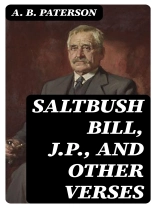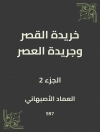A. B. Paterson’s ‘Saltbush Bill, J.P., and Other Verses’ captures the essence of the Australian spirit through lively storytelling and evocative verse. Set against the backdrop of the Australian bush, Paterson employs a conversational and often humorous literary style, seamlessly blending narrative and poetry to explore the lives of iconic characters like Saltbush Bill. This collection, rich in vivid imagery and regional dialect, reflects the influence of the Australian bush ballad tradition and shares insights into the trials faced by rural Australians during the late 19th and early 20th centuries. Born in 1864 in a pastoral region of New South Wales, A. B. Paterson’s upbringing among vast landscapes and the folklore of bush life profoundly shaped his literary voice. He began his career as a solicitor, but his passion for poetry and storytelling led him to become a prominent figure in Australian literature. Paterson’s experiences as a soldier and war correspondent further informed his narratives, enriching his verses with themes of adventure, identity, and resilience. ‘Saltbush Bill, J.P., and Other Verses’ is a must-read for anyone intrigued by the rugged charm of the Australian outback. Paterson’s keen observations and lyrical prowess invite readers to immerse themselves in the rich tapestry of Australia’s cultural landscape, making this collection an essential addition to the library of both poetry enthusiasts and those interested in Australian heritage.
लेखक के बारे में
A.B. Paterson, born Andrew Barton Paterson on February 17, 1864, was a renowned Australian bush poet, journalist, and author whose works encapsulate the rural life and culture of Australia during the late 19th and early 20th centuries. Paterson’s writing, distinguished by its use of vernacular speech, vivid imagery, and engaging rhythm, greatly contributed to the definition of Australian literature and identity.
One of his significant collections of poetry is ‘Saltbush Bill, J.P., and Other Verses’, published in 1917, which features character sketches, tales of rural life, and expressive narratives that resonate with Paterson’s experiences in the Australian Outback. His literary style often reflects a romantic view of the bush and its people while also exhibiting a wry humor and deep appreciation for the landscape. Paterson’s storytelling skill is evident in the characters he creates, such as Saltbush Bill, who epitomizes the archetype of the Australian stockman.
Aside from his poetry, Paterson’s most famous work is arguably ‘The Man from Snowy River’, which further cements his position as a central figure in Australia’s cultural history. Paterson’s influence extended beyond literature; he also served as a correspondent during the Boer War, further diversifying his life’s portfolio. Paterson died on February 5, 1941, leaving behind a rich literary legacy that continues to be celebrated in Australia and around the world.












